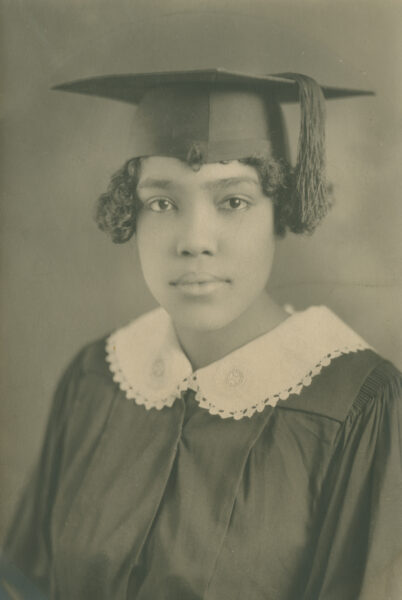
Courtesy Zhang Collection, Western Michigan University Archives
“Diplomatic Historian Merze Tate Dies at 91” read the headline in the Washington Post in the summer of 1996. Despite living in what she aptly called a “sex and race discriminating world,” Tate forged an extraordinary career as a prolific scholar, teacher, and public intellectual. She published groundbreaking histories that relied on an innovative comparative, transimperial, and antiracist approach to studying the Pacific, India, Asia, and Africa. Howard University’s history department’s first Black female faculty member, she served there from 1942 until her retirement in 1977.
Born into a family of midwestern homesteaders, Tate trained in the 1920s at Western Michigan University to be a high school history teacher. She taught at the historic Crispus Attucks High School in Indianapolis while earning a master’s degree from Columbia University in 1930. Thanks to an international study fellowship from her Alpha Kappa Alpha sorority, Tate studied economics and international relations at the University of Oxford, becoming in 1935 the first Black American to earn a graduate degree there. She joined the faculty of Bennett College, where a Rosenwald Fellowship enabled her in 1941 to become the first Black woman to earn a government degree from Harvard University.
Tate brought to print five books, 34 journal articles, and 45 review essays during a time when segregation and discrimination routinely excluded women and Black men from academic publishing and professional societies, including this one. Her books were The Disarmament Illusion: The Movement for a Limitation of Armaments to 1907 (Macmillan, 1942); The United States and Armaments (Harvard Univ. Press, 1948); The United States and the Hawaiian Kingdom: A Political History (Yale Univ. Press, 1965); Hawaii: Reciprocity or Annexation (Michigan State Univ. Press, 1968); and Diplomacy in the Pacific: A Collection of Twenty-Seven Articles on Diplomacy in the Pacific and Influence of the Sandwich (Hawaiian) Islands Missionaries (Howard Univ. Press, 1973).
Her body of work stands as a testament to her intellectual prowess and persistence, as well as to her unusual capacity for both panoramic conceptual imagination and sustained archival research across disparate regions and topics. Tate’s unusual training prepared her to embrace interdisciplinarity before it was in vogue, borrowing methods from diplomatic, economic, and political history; geography and geopolitics; and international relations.
An intrepid solo traveler, she circled the globe twice, sometimes combining her research and her sightseeing. In 1950–51, Tate held one of the earliest Fulbright Fellowships; she requested to go to India and was assigned to Tagore’s Visva-Bharati University near Kolkata, which she used as a base for lecturing in India, Asia, and the Pacific. In the 1970s, she traveled to Africa, about which she had written and taught for decades. Her final research project was an investigation into the expansion of railroads, deep-sea ports, mineral extraction, and international corporate imperialism in postindependence Africa. That work went unpublished, but her attention to the power of global capital was no less prescient as she worried about modern forms of re-imperialization.
Her final published writing came from her role as an interviewer in the Schlesinger Library’s Black Women Oral History Project, for which she was an enthusiastic advisor as well as an interviewee.
Tate’s work and career were recognized at the time but never to the extent they or she deserved. Some professional recognition came late in her life, including the AHA’s 1991 Award for Scholarly Distinction. That happened thanks to the work of the late Rosalyn Terborg-Penn and Joseph Harris as chairs of the newly created committees on women and minority historians, respectively. Still, Tate’s life work was all but erased from the narratives of our discipline and the fields for which she wrote.
Tate led a vibrant social life in Washington, DC, across the United States, and around the world. Her leisure was fed by her broad intellectual and cultural appetites, her powers at the bridge table, her skills as a chef and party giver, and her gift for sustaining friendships across time and space. After her death in Washington, Tate was buried alongside her family in rural Michigan.
Barbara D. Savage
University of Pennsylvania
This work is licensed under a Creative Commons Attribution-NonCommercial-NoDerivatives 4.0 International License. Attribution must provide author name, article title, Perspectives on History, date of publication, and a link to this page. This license applies only to the article, not to text or images used here by permission.